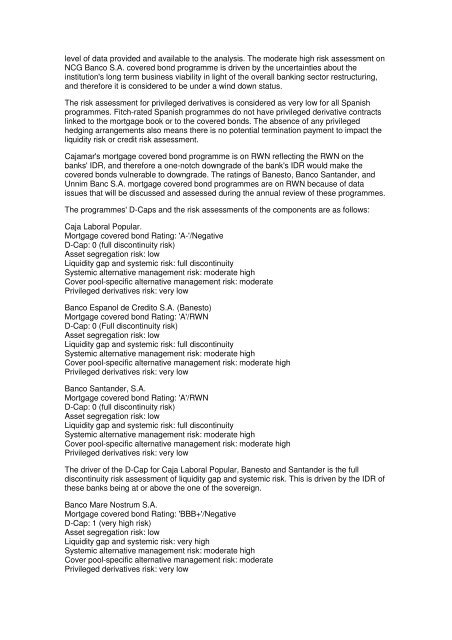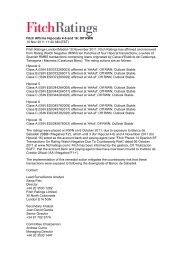Fitch Assigns Spanish Mortgage Covered Bond Programmes ...
Fitch Assigns Spanish Mortgage Covered Bond Programmes ...
Fitch Assigns Spanish Mortgage Covered Bond Programmes ...
- No tags were found...
You also want an ePaper? Increase the reach of your titles
YUMPU automatically turns print PDFs into web optimized ePapers that Google loves.
level of data provided and available to the analysis. The moderate high risk assessment on<br />
NCG Banco S.A. covered bond programme is driven by the uncertainties about the<br />
institution's long term business viability in light of the overall banking sector restructuring,<br />
and therefore it is considered to be under a wind down status.<br />
The risk assessment for privileged derivatives is considered as very low for all <strong>Spanish</strong><br />
programmes. <strong>Fitch</strong>-rated <strong>Spanish</strong> programmes do not have privileged derivative contracts<br />
linked to the mortgage book or to the covered bonds. The absence of any privileged<br />
hedging arrangements also means there is no potential termination payment to impact the<br />
liquidity risk or credit risk assessment.<br />
Cajamar's mortgage covered bond programme is on RWN reflecting the RWN on the<br />
banks' IDR, and therefore a one-notch downgrade of the bank's IDR would make the<br />
covered bonds vulnerable to downgrade. The ratings of Banesto, Banco Santander, and<br />
Unnim Banc S.A. mortgage covered bond programmes are on RWN because of data<br />
issues that will be discussed and assessed during the annual review of these programmes.<br />
The programmes' D-Caps and the risk assessments of the components are as follows:<br />
Caja Laboral Popular.<br />
<strong>Mortgage</strong> covered bond Rating: 'A-'/Negative<br />
D-Cap: 0 (full discontinuity risk)<br />
Asset segregation risk: low<br />
Liquidity gap and systemic risk: full discontinuity<br />
Systemic alternative management risk: moderate high<br />
Cover pool-specific alternative management risk: moderate<br />
Privileged derivatives risk: very low<br />
Banco Espanol de Credito S.A. (Banesto)<br />
<strong>Mortgage</strong> covered bond Rating: 'A'/RWN<br />
D-Cap: 0 (Full discontinuity risk)<br />
Asset segregation risk: low<br />
Liquidity gap and systemic risk: full discontinuity<br />
Systemic alternative management risk: moderate high<br />
Cover pool-specific alternative management risk: moderate high<br />
Privileged derivatives risk: very low<br />
Banco Santander, S.A.<br />
<strong>Mortgage</strong> covered bond Rating: 'A'/RWN<br />
D-Cap: 0 (full discontinuity risk)<br />
Asset segregation risk: low<br />
Liquidity gap and systemic risk: full discontinuity<br />
Systemic alternative management risk: moderate high<br />
Cover pool-specific alternative management risk: moderate high<br />
Privileged derivatives risk: very low<br />
The driver of the D-Cap for Caja Laboral Popular, Banesto and Santander is the full<br />
discontinuity risk assessment of liquidity gap and systemic risk. This is driven by the IDR of<br />
these banks being at or above the one of the sovereign.<br />
Banco Mare Nostrum S.A.<br />
<strong>Mortgage</strong> covered bond Rating: 'BBB+'/Negative<br />
D-Cap: 1 (very high risk)<br />
Asset segregation risk: low<br />
Liquidity gap and systemic risk: very high<br />
Systemic alternative management risk: moderate high<br />
Cover pool-specific alternative management risk: moderate<br />
Privileged derivatives risk: very low




